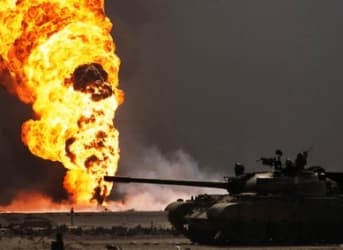The violence and cutthroat politics of the Middle East, combined with declining oil and gas production levels, has triggered a subtle but significant shift away from what has long been the center of the energy industry to other regions around the world.
The overall geopolitical situation in the Middle East has been deteriorating since the first major war between Arabs and Israelis in 1948. Conflicts are becoming more violent, weapons used are deadlier, and the number of casualties keeps rising. The two most recent conflicts in the region –the war in Gaza between Palestinians and Israelis -- claimed the lives of some 2,000 Palestinians and about 60 Israeli soldiers. The incredible slaughterhouse that is a mixture of civil war, religious conflict and social economic conflagration taking place today in Syria and Iraq bears witness to the frightening level of mounting violence every time a conflict resumes in the troubled region.
Despite the fact that the Arabian Gulf region still has the greatest concentration of oil and gas fields anywhere in the world -- oil and gas that is easy to harvest and therefore inexpensive to extract and bring to market, giving oil companies a wider profit -- the price of war and never-ending conflict has begun giving oil majors serious pause. The cost of doing business in a war zone also requires expenditures that in other areas would not normally exist, such as security for personnel and equipment.
Taken together, the challenges of doing business in the Middle East is forcing companies to weigh the advantage of easily mineable resources against the disadvantage of working in conflicted areas.
On top of that, the region’s production and share of the market is in decline, according to a Reuters report published in Arab News.
In 2013, according to the BP Statistical Review of World Energy, countries in the Gulf and Arab Peninsula East “accounted for almost 33 percent of global oil production and 17 percent of gas output.” But those numbers represent a three-year flat line after years of increases.
Middle East oil and gas producers are also increasingly worried about the decline in oil reserves worldwide of production from their areas. It was 48 percent in 2013 -- a significant drop from 2005, when it was 56 percent. In 1993, it was 64 percent.
In the 20-year period between 1993 and 2013, oil and natural gas reserves originating from the Middle Eastern counted for just 1 percent, compared to 4.2 percent from the rest of the world.
Overall production by the Arab oil powerhouses has been slowing in recent years, including in Saudi Arabia and the UAE, considered to be the cornerstones of the Arabian Gulf.
It all adds up to a subtle but significant shifting of the center of the oil and gas universe toward Africa, Asia, and North and South America.
Central Asia -- especially Kazakhstan, Azerbaijan— also seem to be well positioned to attract new business. Additionally, there have been huge recent discoveries off the coast of Southern Africa, as well as off the coast of West Africa and Latin America.
As the Reuters report says, “Advances in horizontal drilling, hydraulic fracturing, seismic surveying and deepwater drilling have opened a much broader global oil and gas resource base, giving exploration and production companies many more options.”
ADVERTISEMENT
Oil and gas companies are increasingly taking those options.
By Claude Salhani of Oilprice.com



















Great reporting Mr. Salhani
In fact, the relative recent stability in non-Arab Middle Eastern countries is in a complete contrast with the internal collapse of the Arab League. Thus, Turkey experienced a decline in PKK rebellion, Iran - a decline in Baluchi and Kurdish insurgencies, Cyprus with declined violence since the 1974 Turkish invasion and even Israel-Palestinian conflict, while experiencing point-eruptions with a thousand or so casualties once every few years is of no comparison to blood-baths in Syria, Iraq and Yemen - where hundreds of thousands have been slaughtered in recent years and millions displaced.
The oil production is the Middle East is concentrated in Saudi Arabia, Arab Gulf states - Kuwait, Qatar, UAE, and Iraq, Iran and to lesser degree in Yemen, Oman and Syria. Only Iraqi output of oil is a real threat to global oil supply, as Syrian and Yemeni outputs are relatively small. Israelis and Palestinians have nothing to do with oil. By not mentioning the danger in Iraq and the constant instability in this country, caused by decades of repressive rule by a Sunni Arab manority (whether Hashemite, Baathist and now ISIS), Mr. Salhani is missing the point.
Blanket statements of this entire region illustrate nothing but ignorance to the the industry.